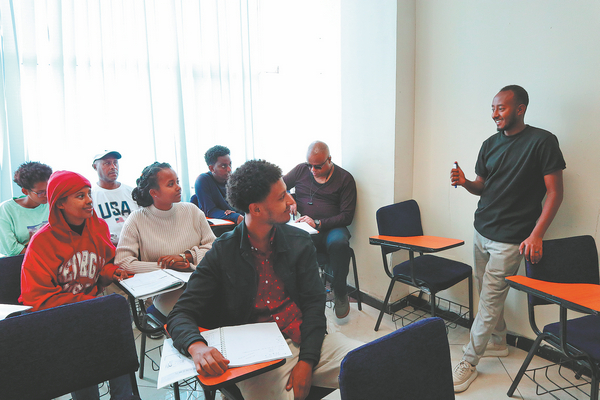
 0 Comment(s)
0 Comment(s) Print
Print E-mail Xinhua, July 5, 2024
E-mail Xinhua, July 5, 2024

Kaleab Zelalem talks with his Chinese-language students during a class in the Ethiopian capital Addis Ababa in June. [Liu Fangqiang/Xinhua]
On a typical Saturday morning, a diverse group of Ethiopian-Chinese language enthusiasts from varied walks of life are eagerly immersed in practicing Mandarin dialogues inside one of the small yet vibrant classrooms that are colorfully decorated with Chinese characters and cultural elements in Addis Ababa, the capital of Ethiopia.
This unique institution, called Ni Hao Habesha Language Training School, is the first of its kind in Ethiopia, established with the overarching goal of spearheading Sino-Ethiopian cultural and language exchanges.
At the heart of this fast-growing ambition is Kaleab Zelalem, a 27-year-old Ethiopian with an "intense passion and admiration "for Chinese culture and language. It all started when Zelalem traveled to China in 2017 where he studied international law for four years in the city of Huangshi, Central China's Hubei province.
Following his return to Ethiopia, Zelalem noticed the ever-growing demand among fellow Ethiopians to learn Chinese. Aware of the gap in addressing this demand and fueled by his newfound admiration for the Chinese culture and language, the young man founded the language training school in 2022, becoming the first private language teaching institution in the East African country, solely specialized in teaching the Chinese language.
"I saw the gap and the demand. Many government officials and business people were looking to learn Chinese, because most Chinese people would be happy if they communicated in their native language. That is when I felt it was time to open a Chinese language school," he says.
His vision was simple — "to not only teach the language but to introduce and impart the unique perspectives and customs that shape the Chinese worldview".
One Chinese lesson at a time, starting some two-and-a-half years ago and further expanding its reach, the school is now transforming how Ethiopians view China and its people, while in the process, discovering a newfound appreciation for the richness of Chinese culture.
The school, as part of its ambition to promote language and cultural exchanges between the two peoples, also offers short Amharic, Ethiopia's working language, training courses to Chinese nationals who are interested in uncovering Ethiopia's culture and language.
"The unique thing about this school is that we not only teach the language, we teach the culture, norms and the way Chinese people perceive the world, which is unique," Zelalem says.
"If we don't understand the language at its heart, we will not be able to communicate effectively. We need to understand the culture to understand China and the Chinese people."
This holistic approach has attracted a diverse set of Ethiopians — government officials, business people, tour guides and college students.
Bethlehem Abera, a business management graduate currently working as a customer relations officer at a local import-export firm, is one such student who believes that the decision to learn Chinese is already paying dividends professionally and personally.
"In my time working with Chinese people, we communicated in English at first. But now, after I started my Chinese class, somehow, we communicate some words in Chinese, which makes them happy. I see the happiness on their faces and I feel proud, too. That is why I feel like I need to learn more every day," she says.
For Abera, her growing ambition to learn the Chinese language and know more about China, its people and its culture is enshrined in the teaching-learning approach implemented at the school, an embodiment of the founder's dream to promote Sino-Ethiopian cultural exchanges.
Senay Alemnew, a 22-year-old graduate student at the Addis Ababa University School of Commerce, is another enthusiast who has been learning Chinese at the school for the past two years.
Echoing the sentiment, Alemnew speaks in awe about the opportunity presented to uncover China and its culture.
"The class is interesting. It has history classes as well, which is nice. My fascination with China is because of its history. It has amazing people and culture. The level of development that they have achieved is very impressive, which is why I started the class, and I look forward to going to China," he says.
In its two-and-a-half years of operation, the school has taught Chinese to more than 500 students who are not only Ethiopians, but Chinese enthusiasts from different nations, such as Austria and Tanzania. In doing so, Zelalem has amassed heartwarming compliments and memories from his students.
With his unwavering passion for bridging the cultural divide, Zelalem and his fast-growing Chinese training school, which now employs three qualified Chinese language instructors, are poised to play a pivotal role in shaping the next chapter of Sino-Ethiopian relations.
As Zelalem looks to the future, he is confident that the demand for Chinese language education in Ethiopia will continue to grow.
"I am pretty sure that for the next few years, the demand for the Chinese language will increase. I do not doubt it," he says.
Go to Forum >>0 Comment(s)